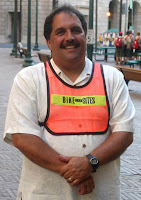실리콘 밸리에서 가장 많이 볼 수 있는 인종은 어느 나라 사람들일까? 그 동네에서 학교도 다니고 일을 해본 경험이 있는 나는 자신있게 Asian (중국, 한국, 인도 특히)이라고 말할 수 있다. 최근 어떤 survey를 바탕으로 작성된 paper를 보니 실제로 실리콘 밸리에서는 아시아인들이 최상의 교육 수준과 소득 수준을 자랑하고 있으며, 실리콘 밸리 바로옆에 있는 Santa Clara County는 최근 연속 3년 동안 미국 전역에서 아시아 인구가 가장 빨리 성장하였다고 한다. BUT,이 보고서에 따르면 실리콘 밸리에서 가장 규모가 크고 이름이 잘 알려진 high-tech 회사 직원 대다수가 아시아 인종이지만, 조직도 위로 올라갈수록 아시아인이 차지하는 비중은 그 밑의 숫자에 비해서 너무나 차이나 나도록 작아진다고 한다. Cisco, SUN, eBay나 AMD의 아시아 인구 비중은 거의 23%에 육박하지만 1999년 이후로는 이 회사들의 이사회에는 아시아인이 한 명도 없었다고 한다. “The Failure of Asian Success in the Bay Area”라는 제목의 이 페이퍼를 보면 많은 아시아인들이 실리콘 밸리의 tech 회사들과 같이 자유분방한 곳에서조차 보이지 않는 유리 천장이 존재한다고 한다. 그리고 여러가지 문화/경제적 요인으로 인해서 일을 잘하는 아시아인들이 실제 C-level의 경영진까지 올라가는게 힘들며, 이사회로 등륵되는건 더욱 더 하늘의 별따기라고 한다. 과연 그래서 일까?
나는 이 기사를 읽으면서 곰곰히 생각을 해봤다. 왜 아시아인들, 특히 한국/일본/중국인들 중에서 우리가 알만한 미국에 본사를 두고 있는 회사의 CEO들이 안 나올까?
-교육 수준이 낮아서? 절대 아니다. 아시아 부모들 만큼 교육 관련해서 극성인 부모들은 없다. 자신은 굶더라도 애들 과외 시키는 부모들은 전세계에서 대한민국 부모들 밖에 없을거다.
-영어를 못해서? 그 많은 교포들은 어디갔는가?
-머리가 나빠서? 수학/과학 올림피아드는 아시아 잔치이다.
나는 인류학자도 아니고, 역사학자도 아니지만 그래도 지금까지 다양한 인종들과 같이 공부하고 일해본 경험에 의하면 몇가지 머리에 떠오르는 이론들이 있는데, 이것들은 100% 내 개인적인 의견들이고 아시아 중에서도 특히 한국 관련 경험을 바탕으로 이야기 하는거니 혹시나 틀리거나 비위가 상했다면 그냥 넘어가 주시기 바란다.
1. 교육 방식 – 교육 수준은 그냥 통계학적으로 얼마나 많은 사람들이 고등학교/대학교/대학원을 졸업하였고, 학/석/박사들이 얼마나 많이 있냐를 말해주는 수치로 알고 있다. 우리나라는 당연히 교육 수준으로 따지자면 세계 최고 수준이다. 그렇지만 교육의 quality를 제대로 보면 서양 교육과 많은 차이가 나는걸 느낄 수 있다. 내 개인적인 경험을 살짝 공개 하면, 나는 학부때는 기계공학을 전공하였다. 그래도 나름대로 열심히 공부했고 학점도 제대로 받았다고 자부할 수 있는데 기계공학의 기초가 되는 몇개의 이론중에 ‘열역학의 법칙 (Laws of Thermodynamics)“이라는게 있다. 여기서 깊게 들어가지는 않겠는데 (실은 나도 잘 기억 안난다 ㅋㅋ), 간단하게 말하자면 이 세상이 돌아가는 이론을 뒷받침하는 몇개의 지배적인 자연의 법칙이다. 학교 다닐때는 이 법칙을 달달 외우고 다녔는데, 막상 국민학생이 나한테 열역학의 법칙에 대해서 물어봤다면 이해하기 쉽게 설명을 하지는 못하였다. 그냥 말 그대로 이론과 공식을 알고 있었으며 교수한테 물어봐도 똑같이 틀에 박힌 숫자와 알파벳을 사용해서 설명을 해줬다.
그러다가 99년도에 미국으로 유학을 왔다. 대학원 첫 수업 시간에 미국인 교수가 열역학의 법칙에 대해서 간단하게 설명을 해줬는데, 이 순간이 나한테는 바로 그 “A-ha!” 순간이었던거 같다. 4년 동안 그냥 껍데기만 알고 있었던 이 법칙을 15분 동안의 노교수의 설명을 듣고 아주 명확하게 이해를 할 수 있었고, 지금은 우리 엄마가 물어봐도 열역학의 법칙에 대해서 이해하기 쉽게 설명할 수 있을거 같다. 물론 이거는 그냥 일례이지만, 이 작은 사실만을 보더라도 우리 나라의 교육은 뭔가 근본적으로 비효율적인게 있다. Asian 교육은 대부분 스스로 생각할 수 있는 틀과 근간을 마련해주기 보다는 머리 회전을 보다 더 빨리 할 수 있도록 외부에서 압박을 가한다고 해야하나…하여튼 사물의 문제점을 진지하게 파악해서 하나 하나씩 해결책을 찾는게 아니라, 많은 아시아인들은 아주 빨리 문제의 해결책을 찾으려고 하는데 그 당시에는 좋은 해결책같아 보이지만, 나중에 껍질을 벗기면 벗길수록 뭔가 좀 엉성한 부분이 있다.
2. The Asian value – 아시아 가정에서 눈에 두드러지게 띄는 점은 부모들이 아직까지는 자녀들이 business men 보다는 professional men이 되길 원하고 있다. 이건 이민 1세던 2세던 크게 다르지는 않다. 모든 아시아 부모들은 자식들이 의사, 변호사 아니면 교수가 되길 바라고 있다. 운동선수, 비즈니스맨 또는 창업을 한다고하면 적극적으로 밀어주는 미국 부모들과는 달리 일단 한두번은 이런 자녀들을 무조건 말릴것이다. 창업이나 비즈니스맨이 의사나 변호사에 비해서 뭐가 뒤지는걸까? 우리 아버지는 어렸을적부터 나한테 “구멍가게를 하더라도 너 자신을 위해서 일을 할줄 아는 사람이 되어라. 월급쟁이도 나쁘지는 않지만 열심히 일해서 남을 부자로 만들어주기보다는 스스로 일해서 스스로 부자가 되는게 더 좋은거다.”라는 말을 습관처럼 해주셨고, 아무것도 몰랐던 소시적에도 이런 말들이 무의식적으로 나한테 적용을 하여서 자라면서 계속 비즈니스와 돈에 관심을 가질 수 있었던거 같다.
전에 내가 LA에 사시는 어떤 부부한테 이런 질문을 한 적이 있다. “아주머니랑 아저씨는 왜 애들한테 공부만 열심히 해서 의사나 변호사가 되라고 하시나요? 미국에는 그거 외에 할게 많을텐데요.” 그러니까 이 부부는 자식들이 “주류사회”에 낄 수 있도록 하기 위해서라고 한다. 주류사회?? 그게 몬데? 주류사회라는 말을 입에 달고 사는 많은 한국 교포들은 스스로 자신들이 비주류사회 구성원이라고 생각을 하니까 주류사회에 끼고 싶어하는거 같은데, 글쎄다…나는 한번도 내가 비주류사회에서 살고 있다는 생각을 해본적이 없어서 백인과 아시아인들 사이에 큰 벽이 있다고 생각을 하는 많은 아시아인들은 그냥 스스로에 대한 자격지심이 아닐까 싶다. 미국같은 잡종사회에서 왠 주류/비주류 사회? 아이사인들이 돈이 없냐, 영어를 못하냐, 교육을 못 받았냐? 오히려 우리가 주류사회 인간들이 아닌가?
이런, 어떻게 보면 조금 수치스러운 Asian 가치들 때문에 어렸을 때부터 우리는 자신감있고 창조적인 생각을 하지 못하는게 아닐까.
3. 부모들의 과잉 보호 – 아시아 부모들의 과잉보호는 내가 굳이 말하지 않아도 유명하다. 자식을 소중하게 생각하고 좋은것만 먹이고, 좋은것만 보여주는건 칭찬 할만하지만 이러한 과잉보호가 스스로 생각하고 스스로 행동할 수 있는 능력을 죽인다는건 모르는거 같다. 비즈니스는 순간적인 decision들의 연속이고, data 없이 감으로 그때그때 결단을 내리려면 스스로 생각하고 스스로에게 의존하는 습관이 몸에 배어야한다.
이렇게 하고 보니 내가 무슨 교육학자가 된거 같은데, 그만큼 가정 교육과 학교 교육이 중요하긴 한거 같다 (물론 나도 학교에 대해서는 회의적이지만…). 아시아인들을 차별한다니, 안보이는 유리 천장이 존재한다니 등등 이러한 변명을 하기에는 이미 우리는 대가리가 너무 커졌고 세상은 너무 평평해진거 같다. 기회는 누구에게나 동등하게 주어졌고, 이 기회를 잘 포착해서 쭉쭉 앞으로 나아가는건 개개인의 자질, 능력 그리고 태도에 달려있다. 남 탓하지 말고 우리 스스로 잘해보자.
